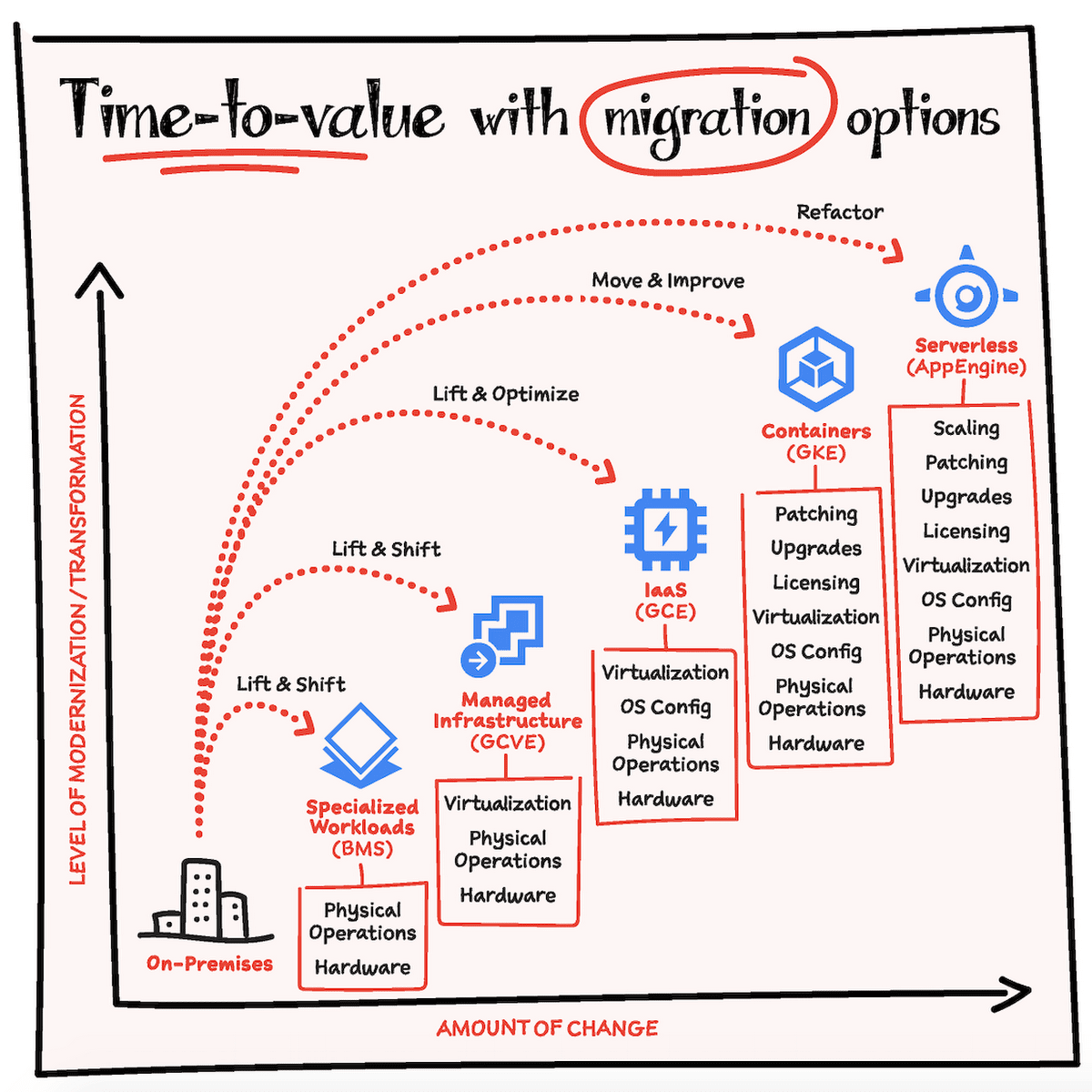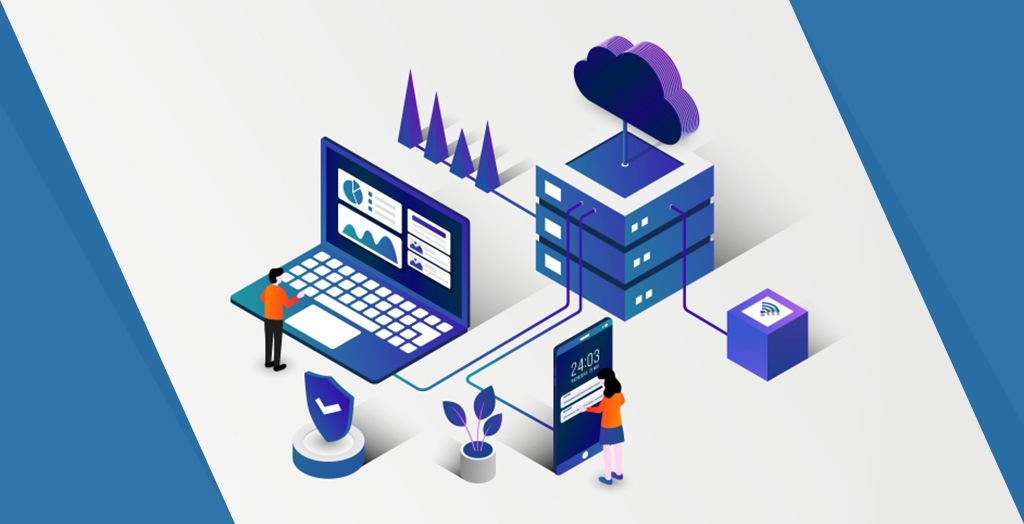Table of Contents
In 2021, if you are still wondering whether to opt for cloud migration or not, you are already behind 94% of the enterprises, according to a hosting tribunal, indicating that cloud migration is now mainstream. In fact, Cisco projects that by the end of 2021, 94% of the workloads will be processed by cloud data centers.
As per the 2021 Q1 report, Amazon Web Services (AWS), controlling 32% of the entire market, came out as the most popular vendor in the cloud infrastructure services market, followed by Microsoft Azure at the second and Google Cloud on the third.- Statista
There are a lot of reasons companies are choosing cloud over customary methods of computing and data storage. If you are one of them, who is looking forward to stepping on the cloud, there are several factors that are worth considering- from the advantages and the challenges associated with the cloud to migration types and migration strategies that suits your business.
Though cloud migration tends to be extremely beneficial for businesses, not everyone needs it. However, before digging deeper into the details of the topic, let’s assess whether you can/should migrate to the cloud or not. To do so, find out the answers to the following questions-
- Are the components of your app virtualizable?
- Can your app stack run in the cloud environment?
- Will your app support the requirements like licensing, privacy, security, and compliance while running on the cloud?
- Will the app dependencies like third-party languages, libraries, and frameworks, be supported in the cloud?
If the answer to all the above questions is ‘Yes’ your app is eligible for the cloud migration. Or Else, you can also reach out to the migration expert, who will assess your app components and figure out the ones which can/ cannot be migrated, thereby take the necessary action for the same.
What Is Cloud Migration?
Cloud migration refers to the process of moving/migrating data as well as digital operations to the cloud. There are three primary cloud types on which you can migrate your data to-
-
Public cloud-
The cloud in which the services are delivered via the internet.
-
Private cloud-
It is a cloud that is designed specifically for internal use by the organization, i.e. it is private to the organization.
-
Hybrid cloud-
Hybrid cloud is the combination of both the public and private cloud.
For detailed insight about the topic, read more: An Introduction to Cloud Computing
So, whether you are doing on-premises migration, cloud-cloud, or cloud to on-premises, you can opt for one of the following Gartners 5R’s models strategies, based on your needs-
-
Rehosting-
Rehosting cloud migration is a strategy in which the app and server are lifted and shifted as-is from a hosting environment to the cloud.
-
Refactor-
This is a migration strategy in which you modify the applications to improve services.
-
Replatform-
It is an advanced form of rehosting that focuses on optimizing the app during migration to take the advantage of the cloud.
-
Rebuild-
This is a strategy in which the developer rewrites the existing application from the scratch which can adapt to the cloud.
-
Replace-
In this, the developer retires the old application and replaces it with a new cloud-native app.

-
- Source: Google Cloud
7 Compelling Reasons To Migrate To The Cloud
-
1. Security
Data security is the biggest thing that floats in everyone’s mind, whether he is a user, developer, or manager himself. There has been a huge misconception about the cloud- that it is not secure and breaking into a cloud is way too easier as compared to the on-premise data.
That’s not true. Many of the companies are switching to the cloud due to its outstanding security services. According to Gartner, the public cloud IaaS workloads experience 60% fewer security incidents than that of the traditional data centers. Cloud providers, considering data security as the top priority, make sure that they leverage stringent security practices for their users.
-
2. Scalability
Cloud is highly scalable, allowing businesses to manage the requirement of the bandwidth. Being easy to scale up and scale down, the business can scale their business at utter convenience, without worrying about purchasing network devices, compatibility issues, and licenses of the software.
-
3. Cost-effective
Being on the cloud liberates you from worrying about heavy investment as in the case of the on-premises infrastructure, in which you have to invest to procure hardware, physical servers, network-related equipment, maintenance as well as software licenses. With cloud computing, all you need to pay is for the initial setup.
-
4. Remote collaboration
The pandemic has shown us the relevance of remote work in an organization as well as the value of cloud computing. Allowing the users to access the data and documents remotely, cloud computing has empowered them to collaborate at a higher scale. With cloud technology, businesses need not limit themselves to geographic locations and they can collaborate and access anything and everything from anywhere, contributing to business growth.
-
5. Disaster recovery
Data loss is the biggest nightmare for every industry. If you are someone looking for solutions for disaster recovery and backup, cloud computing is something you rely upon. With cloud computing, recovering the data becomes easier, efficient, and faster, without any downtime.
-
6. Faster setup
Setting up the cloud is comparatively faster than that from the traditional datacentre setup. Unlike the traditional datacentre, you need not spend time going to the market, purchase the devices and look for the physical servers, instead, cloud migration manages everything at its end.
-
7. Less maintenance
Cloud liberates you from the pain of maintaining the hardware, software, as well as networks and also frees you from paying extra charges for the same. On the contrary with the traditional setup for data storage and computing, you need to keep a track of the hardware and software and maintain, update, and renew the licenses periodically.
Challenges of Cloud Migration
Like any other technology, cloud technology also has cons, hence the migration process is accompanied by a few challenges, which needs to be considered:
-
1. Network Dependency
Being on the internet, dependency on the network becomes inevitable. If you want to access the data on the cloud, you should have a good internet connection and during the migration process, the connection should be even better.
-
2. Technical Issues
As the cloud is managed by an external provider, you do not have complete control over it. For instance, if you face any technical issue in the future, you will have to contact the service provider for rectification.
-
3. Legal Restrictions
Not all the data can be migrated to the cloud, some of them are covered by legal restrictions. Hence, before migrating to the cloud, always check the data against compliance regulations and privacy standards.
Are you ready to embark on your cloud migration journey?
It’s time to get cloud-ready!
So, now that you have understood the significance of cloud migration and decided to migrate your business to the cloud, it’s time to set the stage for the process. Understand the pre-requisites of the cloud migration process-
- Prepare your application for the data migration.
- List down your preferences and objective of the migration
- Conduct a feasibility check regarding cost and resources required in the process
- Prepare yourself for the risks and challenges associated with the process.
- Have a well-defined and assessed cloud migration as well as risk mitigation strategies.
However, if the challenges and the process seems arduous to you, reach out to the experts. At Ace Infoway, we have dedicated experts certified in AWS and Microsoft, who will make the migration smooth and seamless for you. So if you are planning to migrate your business to the cloud, wait no more, hire our cloud migration experts now!


























Leave A Comment